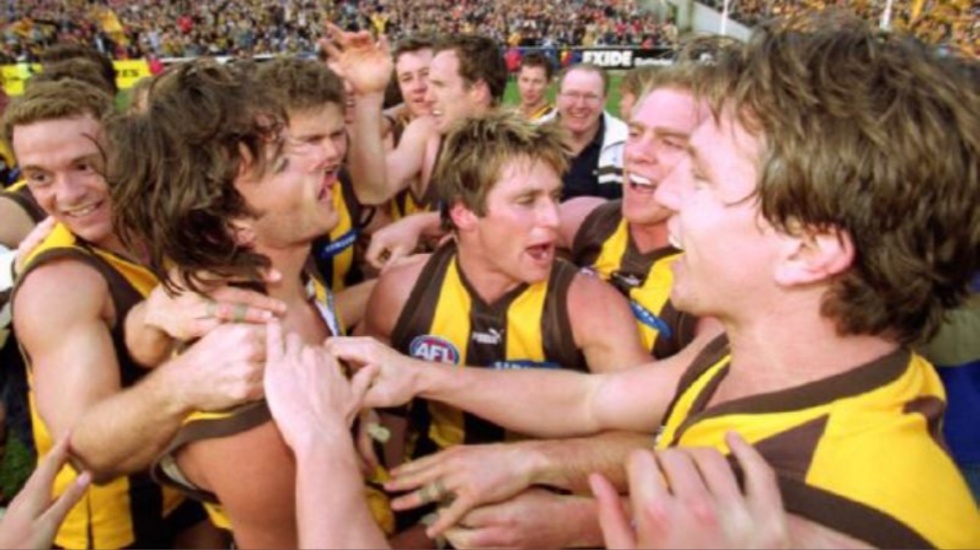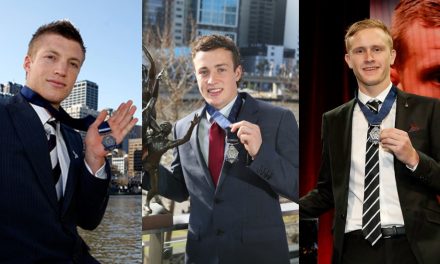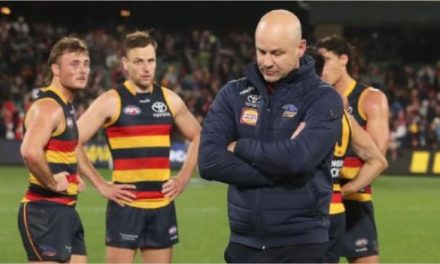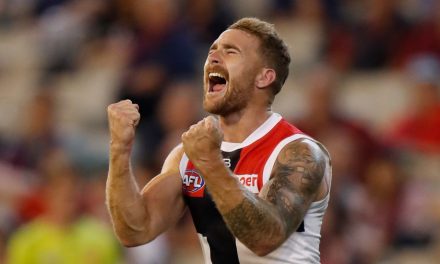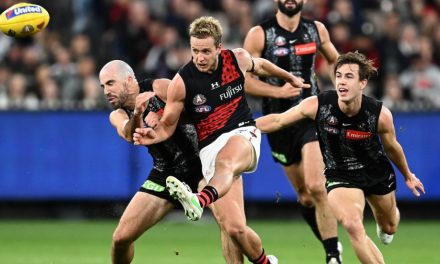Ben Dixon is mobbed by Hawthorn teammates after his matchwinning goal against Carlton in 2001. Photo: GETTY IMAGES
Hawthorn was an emerging young side in its second year under coach Peter Schwab in 2001, and in Round 17 was presented with a big ask against a seasoned campaigner in Carlton.
The Hawks were clinging on to a spot in the top four, but the Blues, who’d been runners-up in 1999 and preliminary finalists in 2000, were coming hard, and victory over Hawthorn would see they and the Hawks trade places.
It was a huge challenge, and suddenly on the Sunday morning, as Hawthorn assistant coach Chris Connolly answered his phone, it became a bit bigger still. “Peter rang up on the Sunday morning at 10 o’clock,” Connolly recalled on “The Front Bar” in 2021, “and said: ‘We’ve got one out’. I said: ‘Who’s that?’ And he said: ‘Me’.
Schwab had suffered a heart scare and been taken to hospital. He would get no closer to the action at the MCG than his sick bed. The coaching apprentice would become the master for a day. And, as events transpired and given Schwab’s condition, perhaps thankfully.
A crowd of 52,472 at the MCG saw Carlton gradually take control of the match, pushing the margin out to 20 points by three-quarter time.
And in a day of unusual occurrences, the Blues’ scoreboard advantage came from an unusual source, none other than veteran AFL full-back of the century Stephen Silvagni, who was sent forward and kicked four first-half goals on Hawk key defender Jonathan Hay.
Veteran on-baller Brett Ratten was also having a big day with 28 disposals and two goals, while for Hawthorn, forwards Ben Dixon and Aaron Lord kept the Hawks’ hopes alive, Brownlow medallist Shane Crawford and Steven Greene both prolife at the coalface.
Carlton remained the superior team and held a clear territorial advantage, the Blues only failing to clinch the deal where it counted most, the margin seldom any more than two or three goals, 3.6 only the return from a particularly dominant third term, by the final change the Blues having had 10 more scoring shots.
Yet a Carlton victory still seemed more than likely for most of the final term. Lord gave Hawthorn the perfect start to the quarter with a goal in under a minute, but Michael Mansfield responded quickly enough for the Blues.
Dixon booted his third goal for the Hawks and Angelo Lekkas another to close the gap to only nine points, but Simon Fletcher gave the Blues breathing space again.
But the young Hawks wouldn’t be denied. Greene brought the margin back to 10 points. And when Trent Croad closed it to just three points, Hawthorn had just over three-and-a-half minutes left to pinch a dramatic victory.
PLEASE HELP US CONTINUE TO THRIVE BY BECOMING AN OFFICIAL FOOTYOLOGY PATRON. JUST CLICK THIS LINK.
Carlton appeared to have done just enough to survive when Hawk Kris Barlow missed a shot from a tight angle, and with only seconds remaining, a Nathan Thompson long bomb inside 50 was repelled by the Blues’ defence, Andy McKay handballing to Mansfield, who handballed to seventh-gamer Jordan Doering.
But as Doering shaped to kick along the boundary line and ensure victory, he was mowed down by a desperate Daniel Chick and caught holding the ball.
With literally the final kick of regular time, Chick desperately pumped the ball inside 50 one last time. And there, working his way to prime position then latching on to a strong mark under all sorts of pressure, was Dixon, 30 metres out on a 45-degree angle.
Dixon would go on to kick 282 goals for Hawthorn in just over 200 games, but none more consequential than this shot to win the game, taken with seemingly just about every Carlton player standing behind the mark, desperately trying to put him off.
“Aim small, miss small was the philosophy,” Dixon recalled of his goalkicking technique to the “Golden Years” podcast 20 years later. “And I’ll never forget it, this bloke had a bucket of chips. I was aiming straight at the bucket of chips. When I hit it, it literally went straight on it. His chips disappeared.”
So did Carlton’s hopes of victory with Dixon’s fourth goal of the afternoon as the Hawks stole a famous win.
“When I lined up I thought I’ve had a million shots from this spot – a million or more,” he said. “And on that side, everyone would say it’s the wrong side for a left-footer, but I love that side, because Jason Dunstall used to teach me how to swing the ball with the seam – like a cricket ball. It was an easy shot, I should have kicked it and I did.”
Pandemonium erupted among the Hawk fans, along with genuine concern for the extra strain which surely must have been placed upon their absent coach’s misbehaving heart muscle.
But coach duly pronounced still alive and well at home, the Hawks celebrated their shoring up of a top-four spot, their rise confirmed later that season with a narrow preliminary final loss to Essendon in a memorable season.
Schwab would recover quickly enough to be back in the coach’s box the following week. Connolly, meanwhile, returned to his assistant’s role, but would soon enough be appointed to Fremantle’s senior coaching position, where he’d spend the next six seasons.
A memorable day would also prove a valuable audition for a top job. And for Connolly, a handy line on the professional CV. As he joked during his appearance on “The Front Bar”: “At the end of the day, statistically, I’m the most successful coach in Hawthorn’s history.”
This article first appeared at ESPN.

